Analyzing Problems Faced by Social Entrepreneurs: A Research Report
VerifiedAdded on 2020/03/16
|16
|3069
|41
Report
AI Summary
This report proposal investigates the challenges faced by social entrepreneurs in establishing and running social enterprises. It begins with a problem statement highlighting the difficulties in balancing social impact with profitability. The research aims to define social entrepreneurship, identify its economic role, differentiate it from other forms of entrepreneurship, and study the specific problems encountered. The methodology includes qualitative research using literature reviews, surveys, and case studies of successful enterprises. The report will explore issues like funding, legislative frameworks, skilled workforce shortages, and lack of focus, ultimately aiming to identify solutions and contribute to the growth and sustainability of social enterprises. The conceptual framework employs a descriptive approach, analyzing collected data to establish relationships between variables, and employing questionnaires and surveys where appropriate. The literature review will compare and contrast various perspectives on social entrepreneurship to identify existing research gaps and provide a basis for further investigation. The study is expected to highlight the unique challenges social entrepreneurs face, contributing to a deeper understanding of the field and supporting the development of effective strategies for success. The report will also explore the reasons behind the rise of social entrepreneurship as a business model.
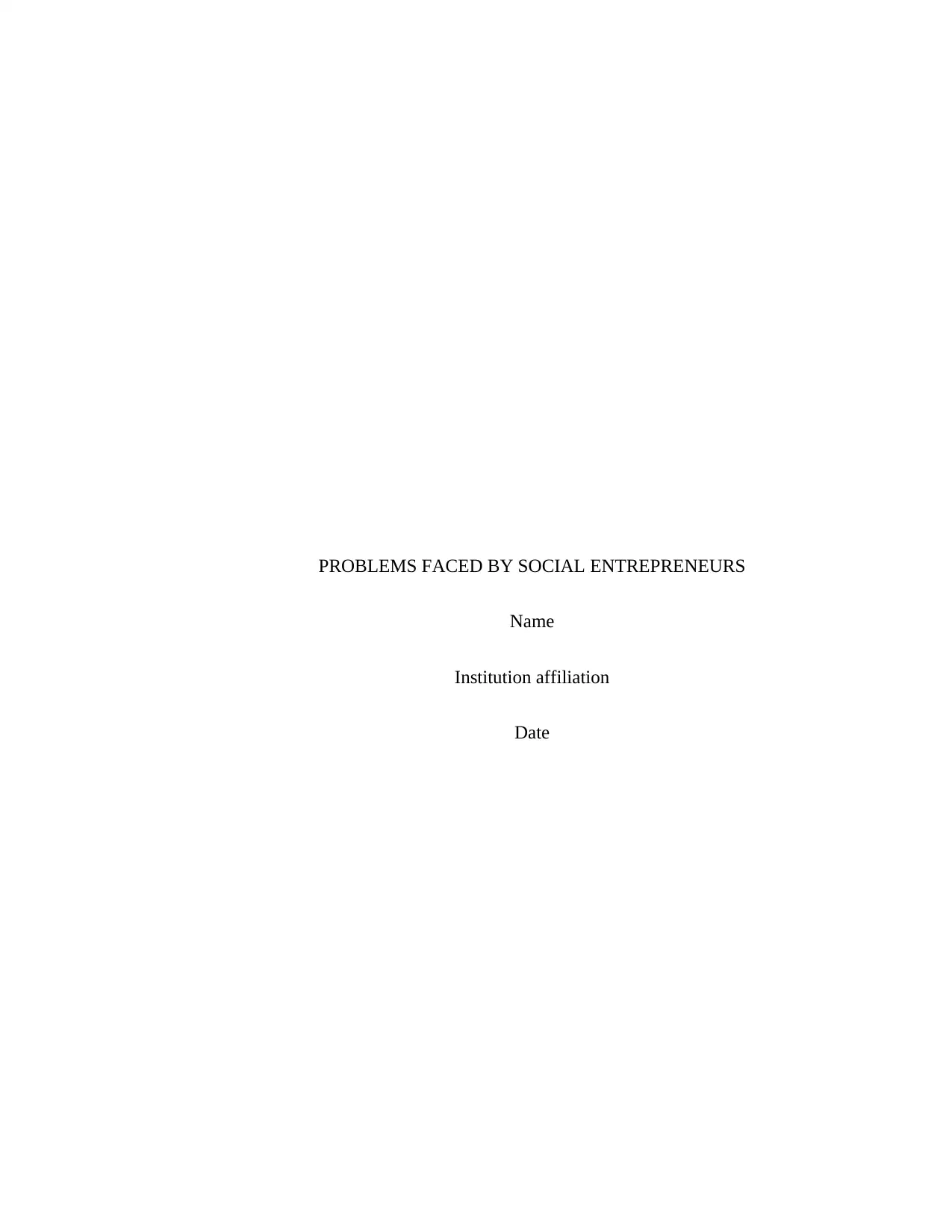
PROBLEMS FACED BY SOCIAL ENTREPRENEURS
Name
Institution affiliation
Date
Name
Institution affiliation
Date
Paraphrase This Document
Need a fresh take? Get an instant paraphrase of this document with our AI Paraphraser

PROBLEMS FACED BY SOCIAL ENTREPRENEURS
Name
Institution affiliation
Date
Name
Institution affiliation
Date

Contents
SECTION I................................................................................................................... 4
INTRODUCTION........................................................................................................... 4
PROBLEM STATEMENT................................................................................................ 4
RESEARCH AIMS AND OBJECTIVES..............................................................................5
RESEARCH QUESTIONS............................................................................................... 6
JUSTIFICATION OF THE PROJECT................................................................................. 6
RESEARCH OUTPUT.................................................................................................... 7
SECTION 11................................................................................................................ 8
CONCEPTUAL FRAMEWORK........................................................................................ 8
LITERATURE REVIEW.................................................................................................. 9
METHODOLOGY........................................................................................................ 11
Qualitative research.............................................................................................. 11
SECTION III............................................................................................................... 12
ORGANIZATION OF THE STUDY................................................................................ 12
PROJECT BUDGET..................................................................................................... 12
PROJECT SCHEDULE.................................................................................................. 14
SECTION I................................................................................................................... 4
INTRODUCTION........................................................................................................... 4
PROBLEM STATEMENT................................................................................................ 4
RESEARCH AIMS AND OBJECTIVES..............................................................................5
RESEARCH QUESTIONS............................................................................................... 6
JUSTIFICATION OF THE PROJECT................................................................................. 6
RESEARCH OUTPUT.................................................................................................... 7
SECTION 11................................................................................................................ 8
CONCEPTUAL FRAMEWORK........................................................................................ 8
LITERATURE REVIEW.................................................................................................. 9
METHODOLOGY........................................................................................................ 11
Qualitative research.............................................................................................. 11
SECTION III............................................................................................................... 12
ORGANIZATION OF THE STUDY................................................................................ 12
PROJECT BUDGET..................................................................................................... 12
PROJECT SCHEDULE.................................................................................................. 14
⊘ This is a preview!⊘
Do you want full access?
Subscribe today to unlock all pages.

Trusted by 1+ million students worldwide
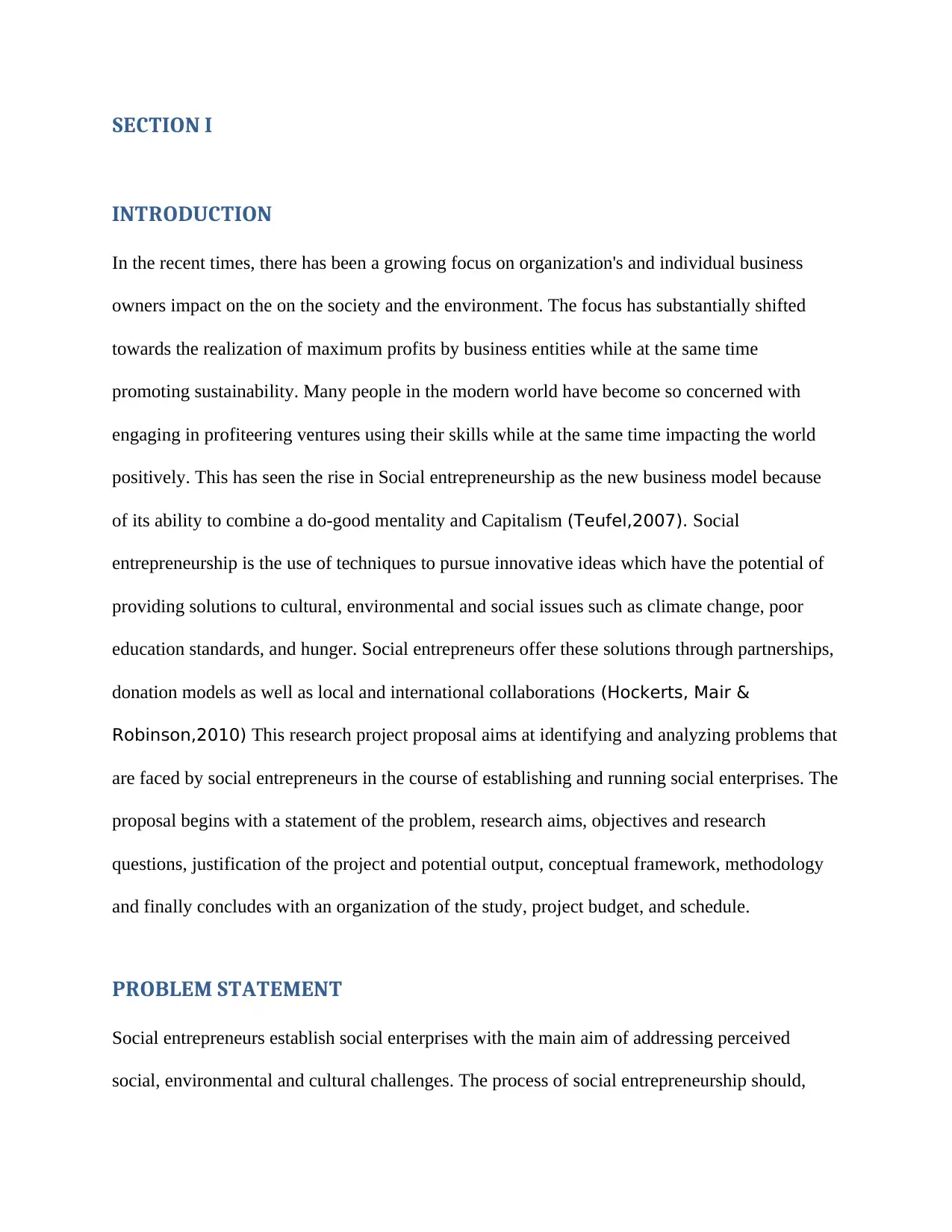
SECTION I
INTRODUCTION
In the recent times, there has been a growing focus on organization's and individual business
owners impact on the on the society and the environment. The focus has substantially shifted
towards the realization of maximum profits by business entities while at the same time
promoting sustainability. Many people in the modern world have become so concerned with
engaging in profiteering ventures using their skills while at the same time impacting the world
positively. This has seen the rise in Social entrepreneurship as the new business model because
of its ability to combine a do-good mentality and Capitalism (Teufel,2007). Social
entrepreneurship is the use of techniques to pursue innovative ideas which have the potential of
providing solutions to cultural, environmental and social issues such as climate change, poor
education standards, and hunger. Social entrepreneurs offer these solutions through partnerships,
donation models as well as local and international collaborations (Hockerts, Mair &
Robinson,2010) This research project proposal aims at identifying and analyzing problems that
are faced by social entrepreneurs in the course of establishing and running social enterprises. The
proposal begins with a statement of the problem, research aims, objectives and research
questions, justification of the project and potential output, conceptual framework, methodology
and finally concludes with an organization of the study, project budget, and schedule.
PROBLEM STATEMENT
Social entrepreneurs establish social enterprises with the main aim of addressing perceived
social, environmental and cultural challenges. The process of social entrepreneurship should,
INTRODUCTION
In the recent times, there has been a growing focus on organization's and individual business
owners impact on the on the society and the environment. The focus has substantially shifted
towards the realization of maximum profits by business entities while at the same time
promoting sustainability. Many people in the modern world have become so concerned with
engaging in profiteering ventures using their skills while at the same time impacting the world
positively. This has seen the rise in Social entrepreneurship as the new business model because
of its ability to combine a do-good mentality and Capitalism (Teufel,2007). Social
entrepreneurship is the use of techniques to pursue innovative ideas which have the potential of
providing solutions to cultural, environmental and social issues such as climate change, poor
education standards, and hunger. Social entrepreneurs offer these solutions through partnerships,
donation models as well as local and international collaborations (Hockerts, Mair &
Robinson,2010) This research project proposal aims at identifying and analyzing problems that
are faced by social entrepreneurs in the course of establishing and running social enterprises. The
proposal begins with a statement of the problem, research aims, objectives and research
questions, justification of the project and potential output, conceptual framework, methodology
and finally concludes with an organization of the study, project budget, and schedule.
PROBLEM STATEMENT
Social entrepreneurs establish social enterprises with the main aim of addressing perceived
social, environmental and cultural challenges. The process of social entrepreneurship should,
Paraphrase This Document
Need a fresh take? Get an instant paraphrase of this document with our AI Paraphraser
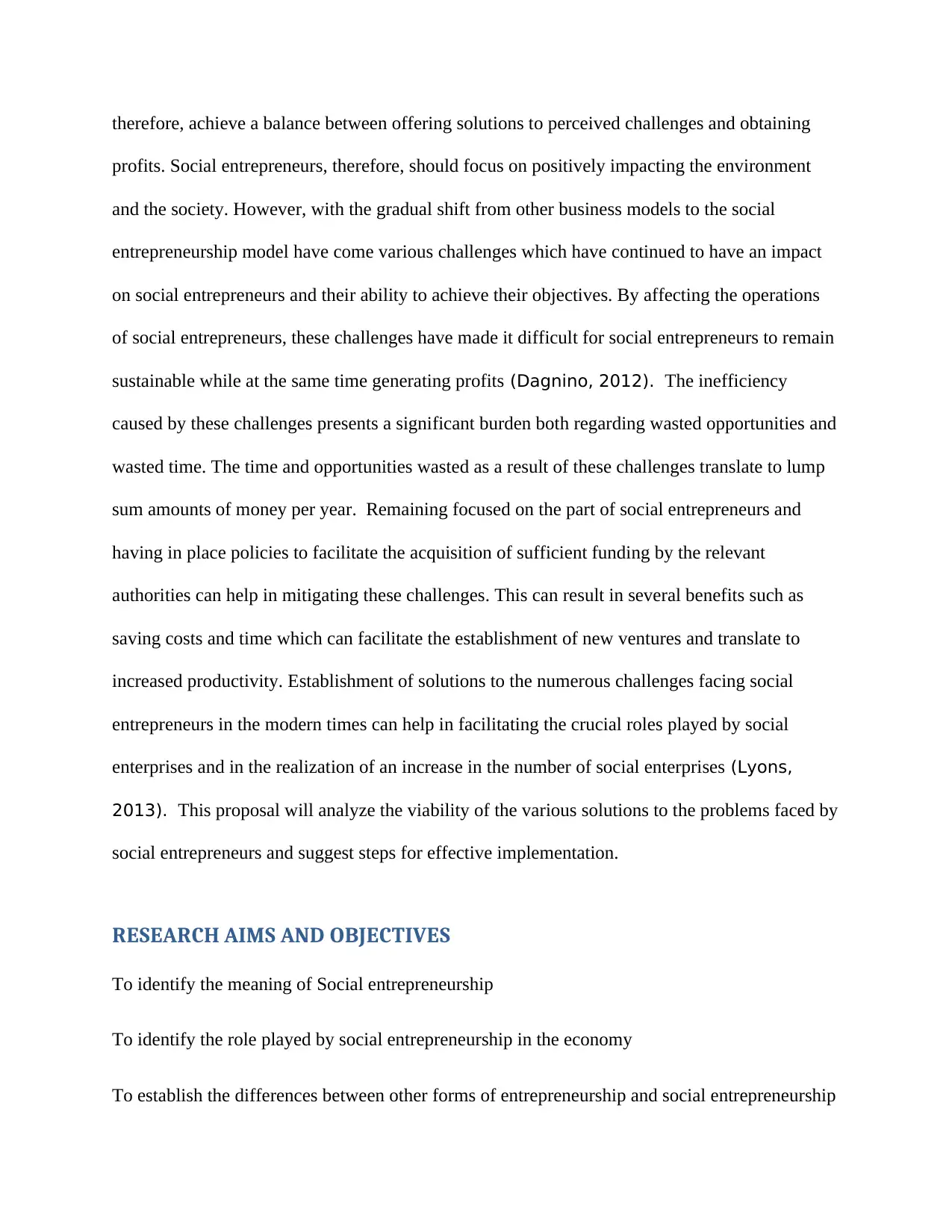
therefore, achieve a balance between offering solutions to perceived challenges and obtaining
profits. Social entrepreneurs, therefore, should focus on positively impacting the environment
and the society. However, with the gradual shift from other business models to the social
entrepreneurship model have come various challenges which have continued to have an impact
on social entrepreneurs and their ability to achieve their objectives. By affecting the operations
of social entrepreneurs, these challenges have made it difficult for social entrepreneurs to remain
sustainable while at the same time generating profits (Dagnino, 2012). The inefficiency
caused by these challenges presents a significant burden both regarding wasted opportunities and
wasted time. The time and opportunities wasted as a result of these challenges translate to lump
sum amounts of money per year. Remaining focused on the part of social entrepreneurs and
having in place policies to facilitate the acquisition of sufficient funding by the relevant
authorities can help in mitigating these challenges. This can result in several benefits such as
saving costs and time which can facilitate the establishment of new ventures and translate to
increased productivity. Establishment of solutions to the numerous challenges facing social
entrepreneurs in the modern times can help in facilitating the crucial roles played by social
enterprises and in the realization of an increase in the number of social enterprises (Lyons,
2013). This proposal will analyze the viability of the various solutions to the problems faced by
social entrepreneurs and suggest steps for effective implementation.
RESEARCH AIMS AND OBJECTIVES
To identify the meaning of Social entrepreneurship
To identify the role played by social entrepreneurship in the economy
To establish the differences between other forms of entrepreneurship and social entrepreneurship
profits. Social entrepreneurs, therefore, should focus on positively impacting the environment
and the society. However, with the gradual shift from other business models to the social
entrepreneurship model have come various challenges which have continued to have an impact
on social entrepreneurs and their ability to achieve their objectives. By affecting the operations
of social entrepreneurs, these challenges have made it difficult for social entrepreneurs to remain
sustainable while at the same time generating profits (Dagnino, 2012). The inefficiency
caused by these challenges presents a significant burden both regarding wasted opportunities and
wasted time. The time and opportunities wasted as a result of these challenges translate to lump
sum amounts of money per year. Remaining focused on the part of social entrepreneurs and
having in place policies to facilitate the acquisition of sufficient funding by the relevant
authorities can help in mitigating these challenges. This can result in several benefits such as
saving costs and time which can facilitate the establishment of new ventures and translate to
increased productivity. Establishment of solutions to the numerous challenges facing social
entrepreneurs in the modern times can help in facilitating the crucial roles played by social
enterprises and in the realization of an increase in the number of social enterprises (Lyons,
2013). This proposal will analyze the viability of the various solutions to the problems faced by
social entrepreneurs and suggest steps for effective implementation.
RESEARCH AIMS AND OBJECTIVES
To identify the meaning of Social entrepreneurship
To identify the role played by social entrepreneurship in the economy
To establish the differences between other forms of entrepreneurship and social entrepreneurship
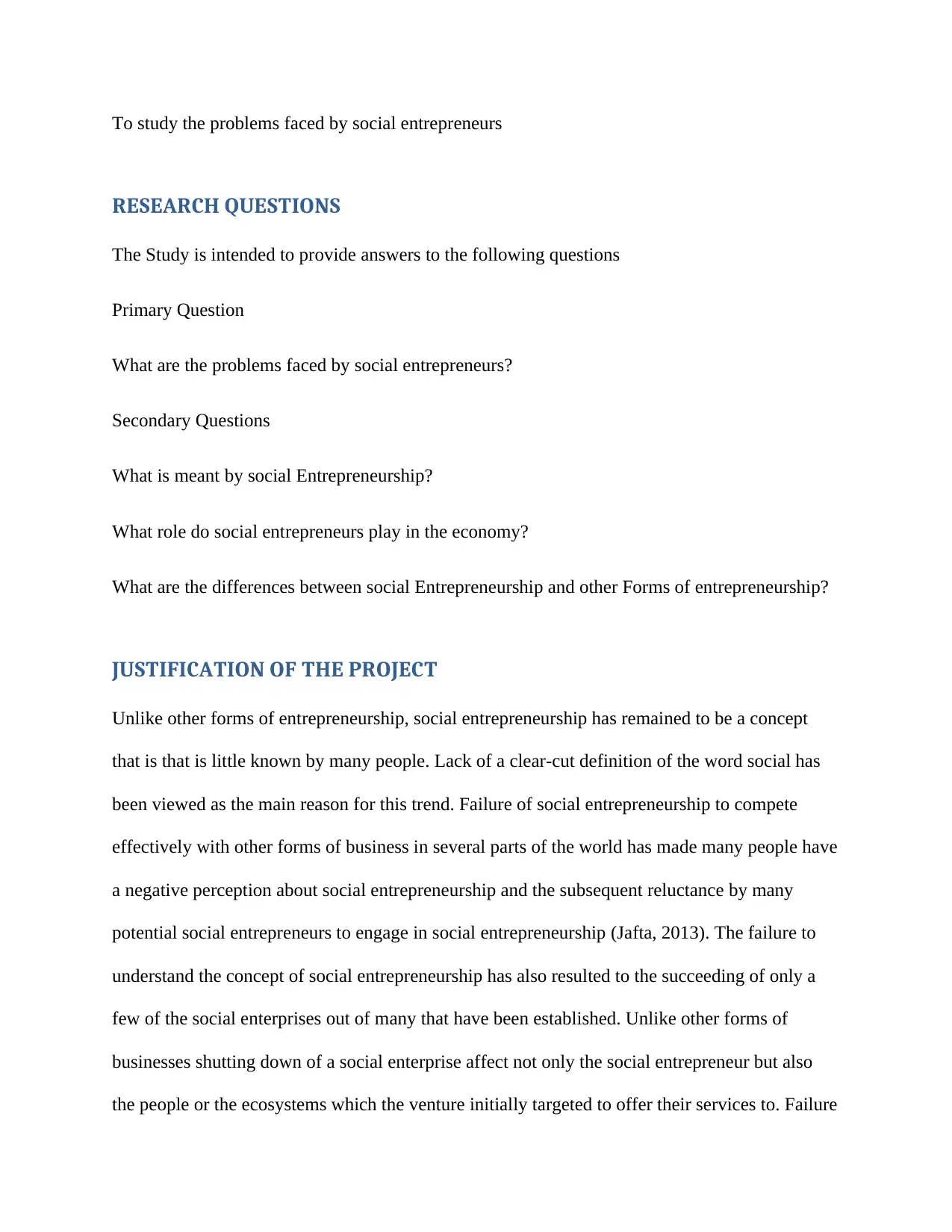
To study the problems faced by social entrepreneurs
RESEARCH QUESTIONS
The Study is intended to provide answers to the following questions
Primary Question
What are the problems faced by social entrepreneurs?
Secondary Questions
What is meant by social Entrepreneurship?
What role do social entrepreneurs play in the economy?
What are the differences between social Entrepreneurship and other Forms of entrepreneurship?
JUSTIFICATION OF THE PROJECT
Unlike other forms of entrepreneurship, social entrepreneurship has remained to be a concept
that is that is little known by many people. Lack of a clear-cut definition of the word social has
been viewed as the main reason for this trend. Failure of social entrepreneurship to compete
effectively with other forms of business in several parts of the world has made many people have
a negative perception about social entrepreneurship and the subsequent reluctance by many
potential social entrepreneurs to engage in social entrepreneurship (Jafta, 2013). The failure to
understand the concept of social entrepreneurship has also resulted to the succeeding of only a
few of the social enterprises out of many that have been established. Unlike other forms of
businesses shutting down of a social enterprise affect not only the social entrepreneur but also
the people or the ecosystems which the venture initially targeted to offer their services to. Failure
RESEARCH QUESTIONS
The Study is intended to provide answers to the following questions
Primary Question
What are the problems faced by social entrepreneurs?
Secondary Questions
What is meant by social Entrepreneurship?
What role do social entrepreneurs play in the economy?
What are the differences between social Entrepreneurship and other Forms of entrepreneurship?
JUSTIFICATION OF THE PROJECT
Unlike other forms of entrepreneurship, social entrepreneurship has remained to be a concept
that is that is little known by many people. Lack of a clear-cut definition of the word social has
been viewed as the main reason for this trend. Failure of social entrepreneurship to compete
effectively with other forms of business in several parts of the world has made many people have
a negative perception about social entrepreneurship and the subsequent reluctance by many
potential social entrepreneurs to engage in social entrepreneurship (Jafta, 2013). The failure to
understand the concept of social entrepreneurship has also resulted to the succeeding of only a
few of the social enterprises out of many that have been established. Unlike other forms of
businesses shutting down of a social enterprise affect not only the social entrepreneur but also
the people or the ecosystems which the venture initially targeted to offer their services to. Failure
⊘ This is a preview!⊘
Do you want full access?
Subscribe today to unlock all pages.

Trusted by 1+ million students worldwide
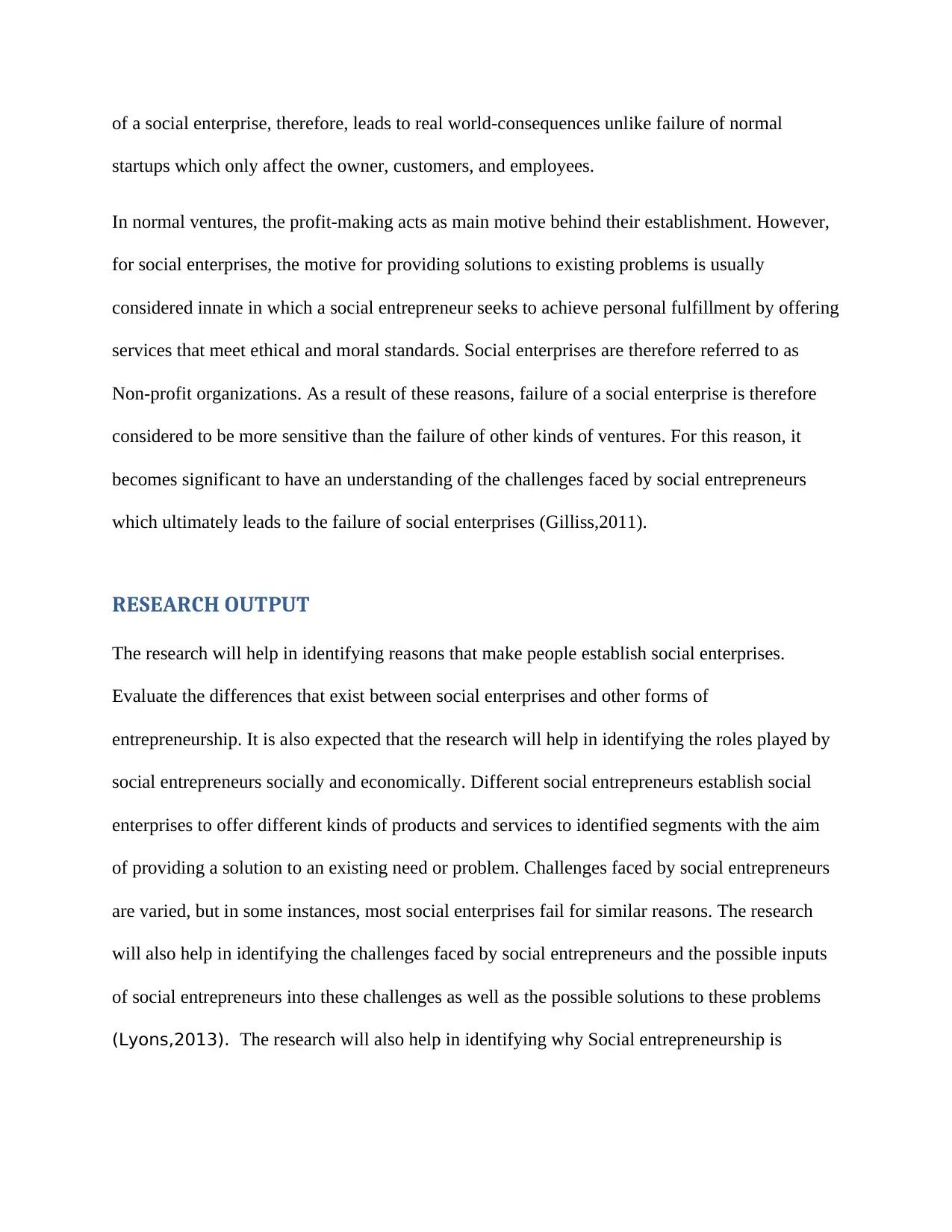
of a social enterprise, therefore, leads to real world-consequences unlike failure of normal
startups which only affect the owner, customers, and employees.
In normal ventures, the profit-making acts as main motive behind their establishment. However,
for social enterprises, the motive for providing solutions to existing problems is usually
considered innate in which a social entrepreneur seeks to achieve personal fulfillment by offering
services that meet ethical and moral standards. Social enterprises are therefore referred to as
Non-profit organizations. As a result of these reasons, failure of a social enterprise is therefore
considered to be more sensitive than the failure of other kinds of ventures. For this reason, it
becomes significant to have an understanding of the challenges faced by social entrepreneurs
which ultimately leads to the failure of social enterprises (Gilliss,2011).
RESEARCH OUTPUT
The research will help in identifying reasons that make people establish social enterprises.
Evaluate the differences that exist between social enterprises and other forms of
entrepreneurship. It is also expected that the research will help in identifying the roles played by
social entrepreneurs socially and economically. Different social entrepreneurs establish social
enterprises to offer different kinds of products and services to identified segments with the aim
of providing a solution to an existing need or problem. Challenges faced by social entrepreneurs
are varied, but in some instances, most social enterprises fail for similar reasons. The research
will also help in identifying the challenges faced by social entrepreneurs and the possible inputs
of social entrepreneurs into these challenges as well as the possible solutions to these problems
(Lyons,2013). The research will also help in identifying why Social entrepreneurship is
startups which only affect the owner, customers, and employees.
In normal ventures, the profit-making acts as main motive behind their establishment. However,
for social enterprises, the motive for providing solutions to existing problems is usually
considered innate in which a social entrepreneur seeks to achieve personal fulfillment by offering
services that meet ethical and moral standards. Social enterprises are therefore referred to as
Non-profit organizations. As a result of these reasons, failure of a social enterprise is therefore
considered to be more sensitive than the failure of other kinds of ventures. For this reason, it
becomes significant to have an understanding of the challenges faced by social entrepreneurs
which ultimately leads to the failure of social enterprises (Gilliss,2011).
RESEARCH OUTPUT
The research will help in identifying reasons that make people establish social enterprises.
Evaluate the differences that exist between social enterprises and other forms of
entrepreneurship. It is also expected that the research will help in identifying the roles played by
social entrepreneurs socially and economically. Different social entrepreneurs establish social
enterprises to offer different kinds of products and services to identified segments with the aim
of providing a solution to an existing need or problem. Challenges faced by social entrepreneurs
are varied, but in some instances, most social enterprises fail for similar reasons. The research
will also help in identifying the challenges faced by social entrepreneurs and the possible inputs
of social entrepreneurs into these challenges as well as the possible solutions to these problems
(Lyons,2013). The research will also help in identifying why Social entrepreneurship is
Paraphrase This Document
Need a fresh take? Get an instant paraphrase of this document with our AI Paraphraser
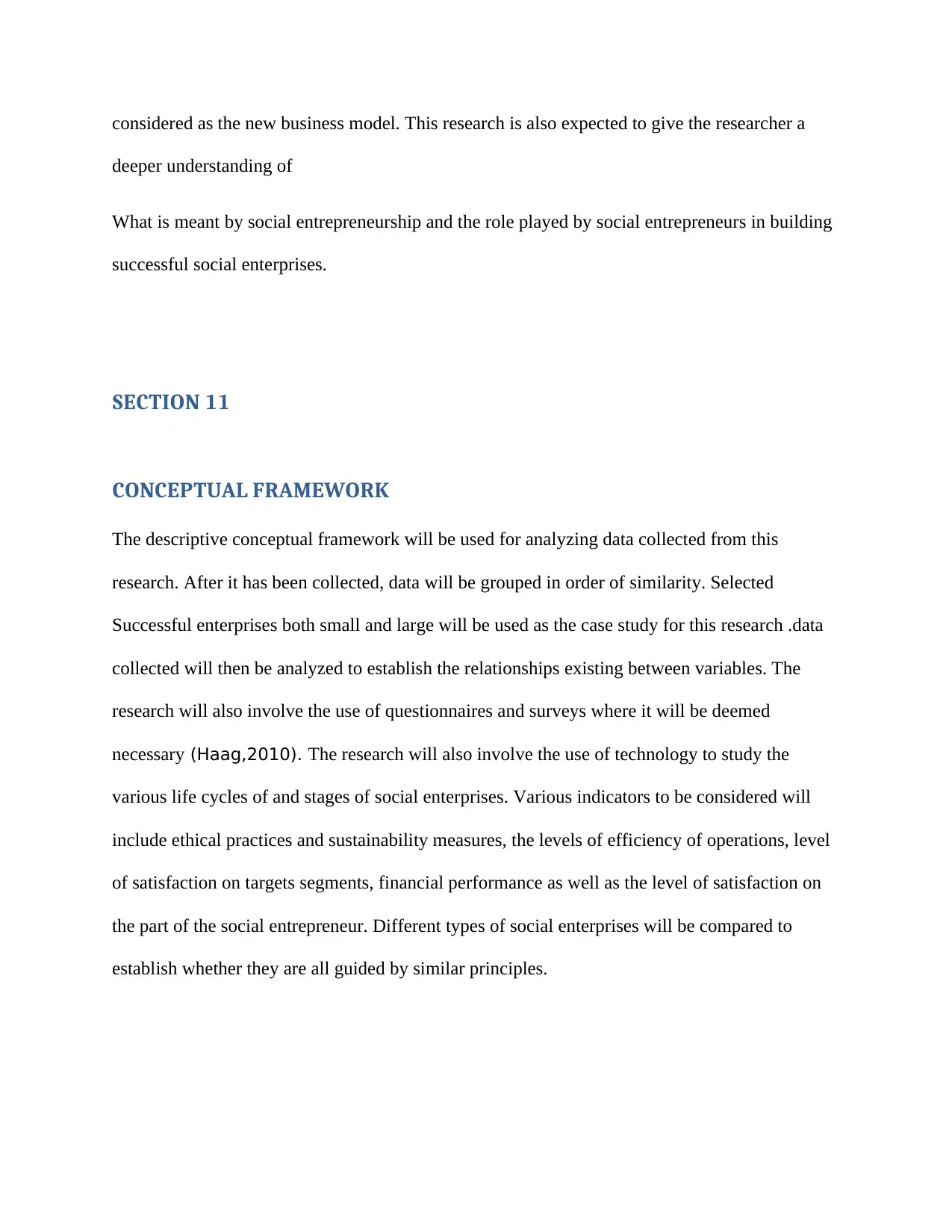
considered as the new business model. This research is also expected to give the researcher a
deeper understanding of
What is meant by social entrepreneurship and the role played by social entrepreneurs in building
successful social enterprises.
SECTION 11
CONCEPTUAL FRAMEWORK
The descriptive conceptual framework will be used for analyzing data collected from this
research. After it has been collected, data will be grouped in order of similarity. Selected
Successful enterprises both small and large will be used as the case study for this research .data
collected will then be analyzed to establish the relationships existing between variables. The
research will also involve the use of questionnaires and surveys where it will be deemed
necessary (Haag,2010). The research will also involve the use of technology to study the
various life cycles of and stages of social enterprises. Various indicators to be considered will
include ethical practices and sustainability measures, the levels of efficiency of operations, level
of satisfaction on targets segments, financial performance as well as the level of satisfaction on
the part of the social entrepreneur. Different types of social enterprises will be compared to
establish whether they are all guided by similar principles.
deeper understanding of
What is meant by social entrepreneurship and the role played by social entrepreneurs in building
successful social enterprises.
SECTION 11
CONCEPTUAL FRAMEWORK
The descriptive conceptual framework will be used for analyzing data collected from this
research. After it has been collected, data will be grouped in order of similarity. Selected
Successful enterprises both small and large will be used as the case study for this research .data
collected will then be analyzed to establish the relationships existing between variables. The
research will also involve the use of questionnaires and surveys where it will be deemed
necessary (Haag,2010). The research will also involve the use of technology to study the
various life cycles of and stages of social enterprises. Various indicators to be considered will
include ethical practices and sustainability measures, the levels of efficiency of operations, level
of satisfaction on targets segments, financial performance as well as the level of satisfaction on
the part of the social entrepreneur. Different types of social enterprises will be compared to
establish whether they are all guided by similar principles.
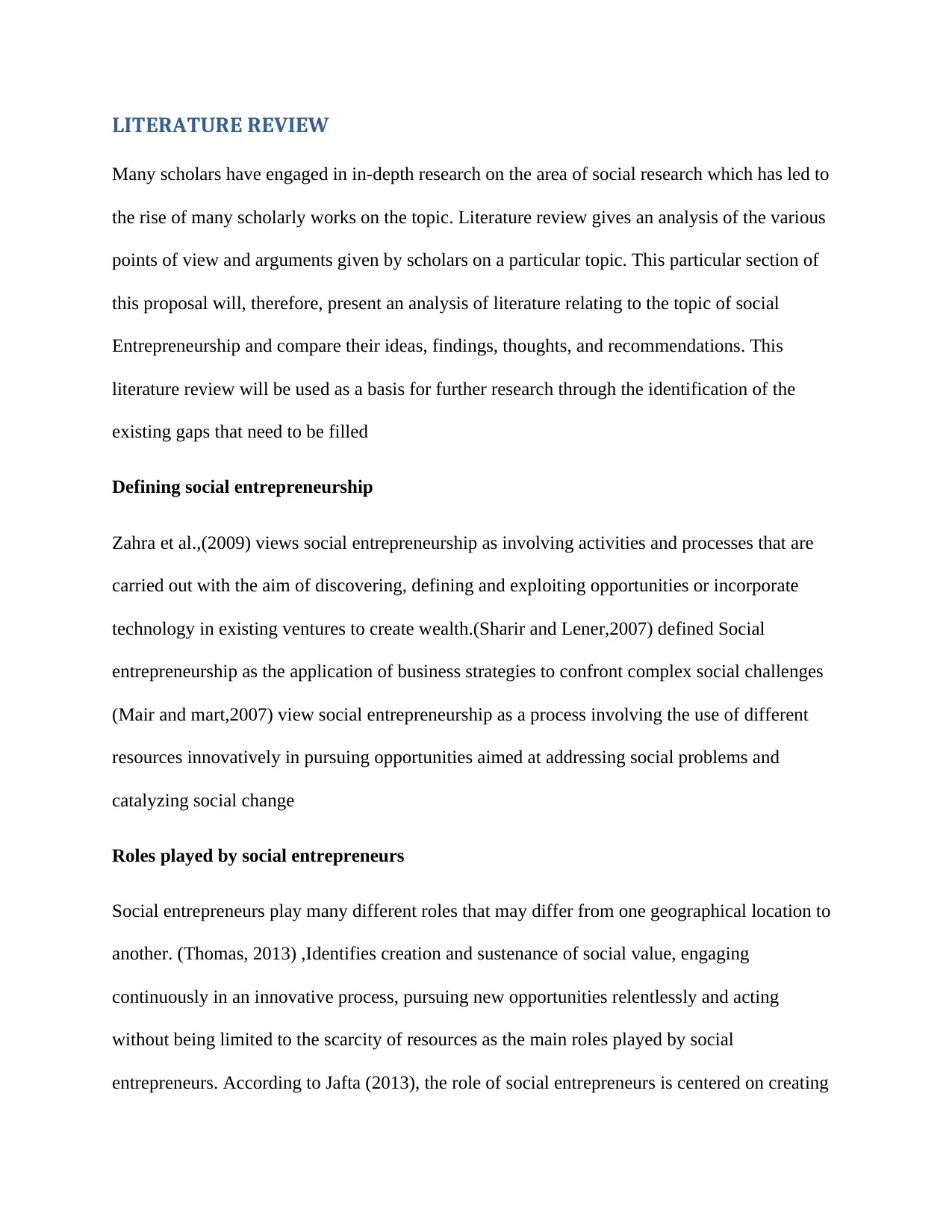
LITERATURE REVIEW
Many scholars have engaged in in-depth research on the area of social research which has led to
the rise of many scholarly works on the topic. Literature review gives an analysis of the various
points of view and arguments given by scholars on a particular topic. This particular section of
this proposal will, therefore, present an analysis of literature relating to the topic of social
Entrepreneurship and compare their ideas, findings, thoughts, and recommendations. This
literature review will be used as a basis for further research through the identification of the
existing gaps that need to be filled
Defining social entrepreneurship
Zahra et al.,(2009) views social entrepreneurship as involving activities and processes that are
carried out with the aim of discovering, defining and exploiting opportunities or incorporate
technology in existing ventures to create wealth.(Sharir and Lener,2007) defined Social
entrepreneurship as the application of business strategies to confront complex social challenges
(Mair and mart,2007) view social entrepreneurship as a process involving the use of different
resources innovatively in pursuing opportunities aimed at addressing social problems and
catalyzing social change
Roles played by social entrepreneurs
Social entrepreneurs play many different roles that may differ from one geographical location to
another. (Thomas, 2013) ,Identifies creation and sustenance of social value, engaging
continuously in an innovative process, pursuing new opportunities relentlessly and acting
without being limited to the scarcity of resources as the main roles played by social
entrepreneurs. According to Jafta (2013), the role of social entrepreneurs is centered on creating
Many scholars have engaged in in-depth research on the area of social research which has led to
the rise of many scholarly works on the topic. Literature review gives an analysis of the various
points of view and arguments given by scholars on a particular topic. This particular section of
this proposal will, therefore, present an analysis of literature relating to the topic of social
Entrepreneurship and compare their ideas, findings, thoughts, and recommendations. This
literature review will be used as a basis for further research through the identification of the
existing gaps that need to be filled
Defining social entrepreneurship
Zahra et al.,(2009) views social entrepreneurship as involving activities and processes that are
carried out with the aim of discovering, defining and exploiting opportunities or incorporate
technology in existing ventures to create wealth.(Sharir and Lener,2007) defined Social
entrepreneurship as the application of business strategies to confront complex social challenges
(Mair and mart,2007) view social entrepreneurship as a process involving the use of different
resources innovatively in pursuing opportunities aimed at addressing social problems and
catalyzing social change
Roles played by social entrepreneurs
Social entrepreneurs play many different roles that may differ from one geographical location to
another. (Thomas, 2013) ,Identifies creation and sustenance of social value, engaging
continuously in an innovative process, pursuing new opportunities relentlessly and acting
without being limited to the scarcity of resources as the main roles played by social
entrepreneurs. According to Jafta (2013), the role of social entrepreneurs is centered on creating
⊘ This is a preview!⊘
Do you want full access?
Subscribe today to unlock all pages.

Trusted by 1+ million students worldwide
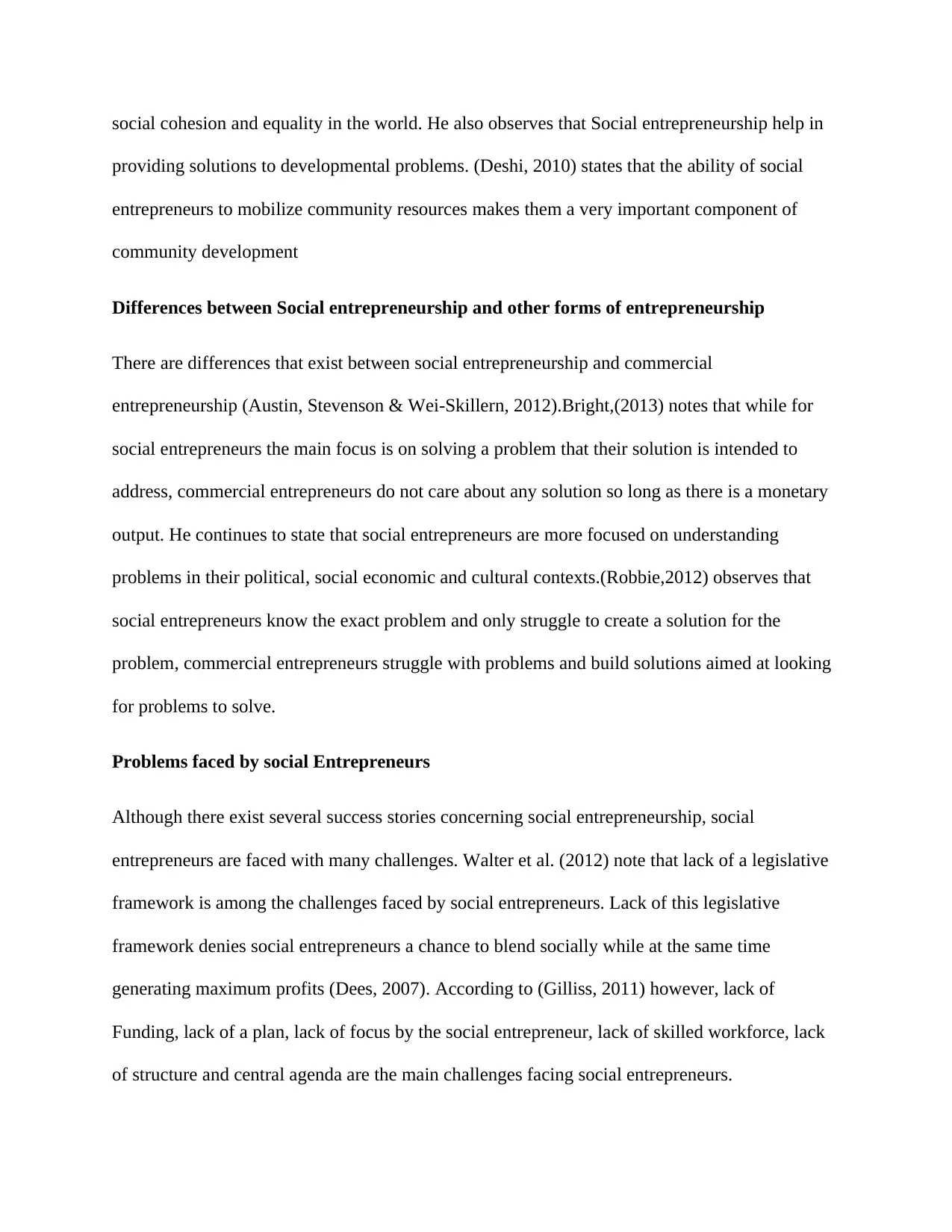
social cohesion and equality in the world. He also observes that Social entrepreneurship help in
providing solutions to developmental problems. (Deshi, 2010) states that the ability of social
entrepreneurs to mobilize community resources makes them a very important component of
community development
Differences between Social entrepreneurship and other forms of entrepreneurship
There are differences that exist between social entrepreneurship and commercial
entrepreneurship (Austin, Stevenson & Wei-Skillern, 2012).Bright,(2013) notes that while for
social entrepreneurs the main focus is on solving a problem that their solution is intended to
address, commercial entrepreneurs do not care about any solution so long as there is a monetary
output. He continues to state that social entrepreneurs are more focused on understanding
problems in their political, social economic and cultural contexts.(Robbie,2012) observes that
social entrepreneurs know the exact problem and only struggle to create a solution for the
problem, commercial entrepreneurs struggle with problems and build solutions aimed at looking
for problems to solve.
Problems faced by social Entrepreneurs
Although there exist several success stories concerning social entrepreneurship, social
entrepreneurs are faced with many challenges. Walter et al. (2012) note that lack of a legislative
framework is among the challenges faced by social entrepreneurs. Lack of this legislative
framework denies social entrepreneurs a chance to blend socially while at the same time
generating maximum profits (Dees, 2007). According to (Gilliss, 2011) however, lack of
Funding, lack of a plan, lack of focus by the social entrepreneur, lack of skilled workforce, lack
of structure and central agenda are the main challenges facing social entrepreneurs.
providing solutions to developmental problems. (Deshi, 2010) states that the ability of social
entrepreneurs to mobilize community resources makes them a very important component of
community development
Differences between Social entrepreneurship and other forms of entrepreneurship
There are differences that exist between social entrepreneurship and commercial
entrepreneurship (Austin, Stevenson & Wei-Skillern, 2012).Bright,(2013) notes that while for
social entrepreneurs the main focus is on solving a problem that their solution is intended to
address, commercial entrepreneurs do not care about any solution so long as there is a monetary
output. He continues to state that social entrepreneurs are more focused on understanding
problems in their political, social economic and cultural contexts.(Robbie,2012) observes that
social entrepreneurs know the exact problem and only struggle to create a solution for the
problem, commercial entrepreneurs struggle with problems and build solutions aimed at looking
for problems to solve.
Problems faced by social Entrepreneurs
Although there exist several success stories concerning social entrepreneurship, social
entrepreneurs are faced with many challenges. Walter et al. (2012) note that lack of a legislative
framework is among the challenges faced by social entrepreneurs. Lack of this legislative
framework denies social entrepreneurs a chance to blend socially while at the same time
generating maximum profits (Dees, 2007). According to (Gilliss, 2011) however, lack of
Funding, lack of a plan, lack of focus by the social entrepreneur, lack of skilled workforce, lack
of structure and central agenda are the main challenges facing social entrepreneurs.
Paraphrase This Document
Need a fresh take? Get an instant paraphrase of this document with our AI Paraphraser
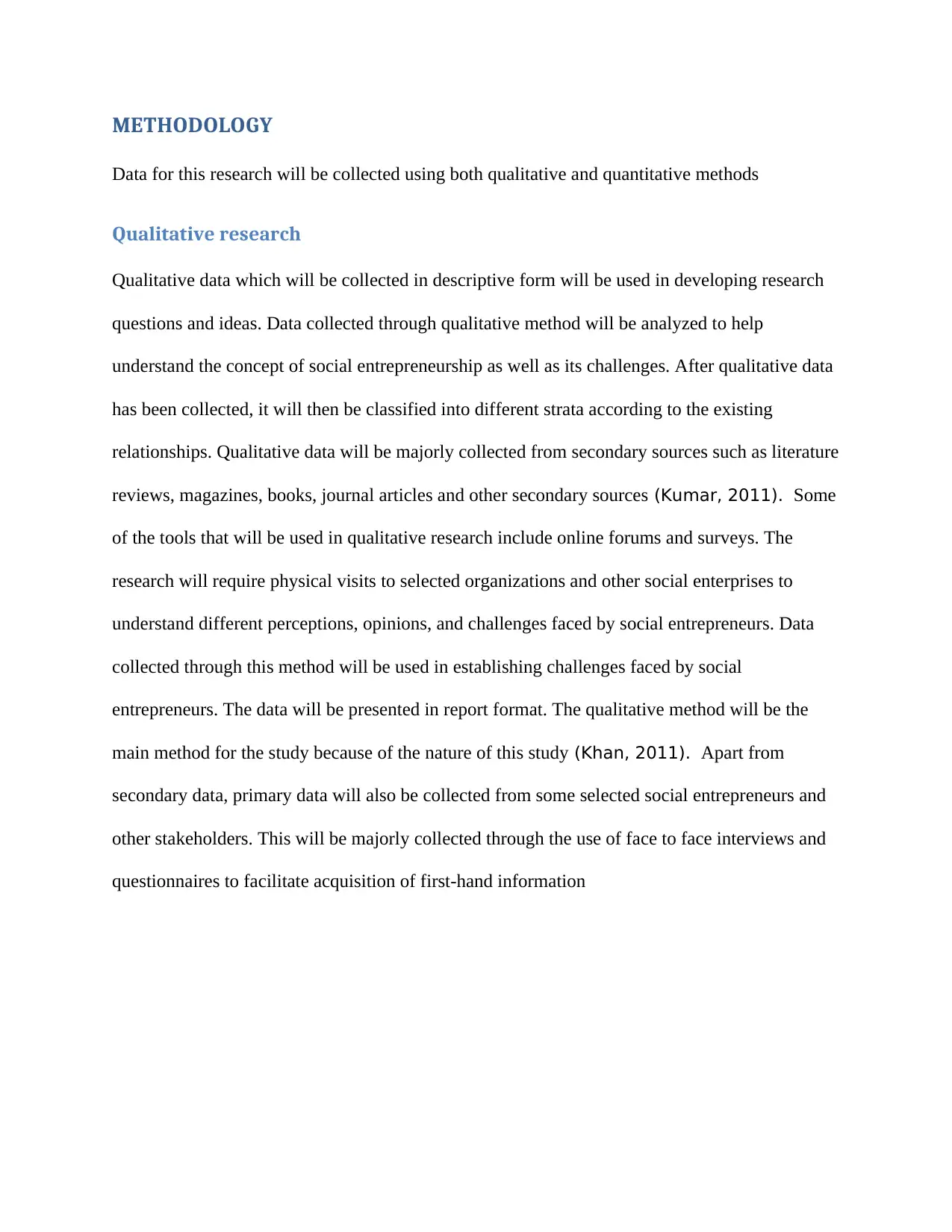
METHODOLOGY
Data for this research will be collected using both qualitative and quantitative methods
Qualitative research
Qualitative data which will be collected in descriptive form will be used in developing research
questions and ideas. Data collected through qualitative method will be analyzed to help
understand the concept of social entrepreneurship as well as its challenges. After qualitative data
has been collected, it will then be classified into different strata according to the existing
relationships. Qualitative data will be majorly collected from secondary sources such as literature
reviews, magazines, books, journal articles and other secondary sources (Kumar, 2011). Some
of the tools that will be used in qualitative research include online forums and surveys. The
research will require physical visits to selected organizations and other social enterprises to
understand different perceptions, opinions, and challenges faced by social entrepreneurs. Data
collected through this method will be used in establishing challenges faced by social
entrepreneurs. The data will be presented in report format. The qualitative method will be the
main method for the study because of the nature of this study (Khan, 2011). Apart from
secondary data, primary data will also be collected from some selected social entrepreneurs and
other stakeholders. This will be majorly collected through the use of face to face interviews and
questionnaires to facilitate acquisition of first-hand information
Data for this research will be collected using both qualitative and quantitative methods
Qualitative research
Qualitative data which will be collected in descriptive form will be used in developing research
questions and ideas. Data collected through qualitative method will be analyzed to help
understand the concept of social entrepreneurship as well as its challenges. After qualitative data
has been collected, it will then be classified into different strata according to the existing
relationships. Qualitative data will be majorly collected from secondary sources such as literature
reviews, magazines, books, journal articles and other secondary sources (Kumar, 2011). Some
of the tools that will be used in qualitative research include online forums and surveys. The
research will require physical visits to selected organizations and other social enterprises to
understand different perceptions, opinions, and challenges faced by social entrepreneurs. Data
collected through this method will be used in establishing challenges faced by social
entrepreneurs. The data will be presented in report format. The qualitative method will be the
main method for the study because of the nature of this study (Khan, 2011). Apart from
secondary data, primary data will also be collected from some selected social entrepreneurs and
other stakeholders. This will be majorly collected through the use of face to face interviews and
questionnaires to facilitate acquisition of first-hand information

SECTION III
ORGANIZATION OF THE STUDY
The following will be the organization of the study
Chapter one: Title and introduction to the research subject
Chapter two: Justification of the research and potential output
Chapter three: Literature review
Chapter Four: Research Methodology
Chapter Five: Analysis and discussion and summarizing of findings from the research
PROJECT BUDGET
The Figures shown below are the budget estimates estimate required to successfully conduct the
research.
Budget item Cost($)
Travel 1280
Printing cost 2860
Consultation fees 1,370
Material and supplies Printing cost 450
ORGANIZATION OF THE STUDY
The following will be the organization of the study
Chapter one: Title and introduction to the research subject
Chapter two: Justification of the research and potential output
Chapter three: Literature review
Chapter Four: Research Methodology
Chapter Five: Analysis and discussion and summarizing of findings from the research
PROJECT BUDGET
The Figures shown below are the budget estimates estimate required to successfully conduct the
research.
Budget item Cost($)
Travel 1280
Printing cost 2860
Consultation fees 1,370
Material and supplies Printing cost 450
⊘ This is a preview!⊘
Do you want full access?
Subscribe today to unlock all pages.

Trusted by 1+ million students worldwide
1 out of 16
Related Documents
Your All-in-One AI-Powered Toolkit for Academic Success.
+13062052269
info@desklib.com
Available 24*7 on WhatsApp / Email
![[object Object]](/_next/static/media/star-bottom.7253800d.svg)
Unlock your academic potential
Copyright © 2020–2026 A2Z Services. All Rights Reserved. Developed and managed by ZUCOL.





